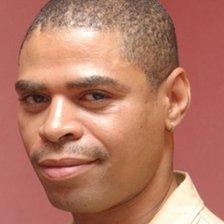Sean Rigg inquest: Met Police used unsuitable force
- Published

Sean Rigg died at Brixton police station in 2008
Police used an unsuitable level of force before the death of a schizophrenic man in custody, an inquest jury has found.
Karate expert Sean Rigg, 40, was held after a claim he had attacked passers-by in Balham, south London, in 2008. He died at Brixton police station.
Southwark Coroner's Court heard he had not been taking his medication.
Returning a narrative verdict, jurors found police handling of the death had showed an "absence of leadership".
Coroner Andrew Harris said: "The level of force used on Sean Rigg whilst he was restrained in the prone position at the Weir estate was unsuitable.
"In addition, there was an absence of leadership.
"This led to a failure to take appropriate control of the situation."
Mr Rigg, who had a history of problems with the law, had been diagnosed with schizophrenia as a 20-year-old.
In May 2008 he was living at a hostel run by Penrose Housing Association in Fairmount Road, Brixton.
Staff there called 999 just before 17:00 BST when he smashed up a gazebo and threatened staff.
Over the next three hours, staff at Penrose made another four emergency calls to police, but help had not arrived.
By 20:00, when they made their final call, he had left the hostel and was then reported to have attacked a young couple.
Within 10 minutes of the report, he was restrained by three police officers on the Weir Estate in Brixton.
Later that evening he collapsed at Brixton police station suffering from a heart arrhythmia, which was the medical cause of Mr Rigg's death.
The court heard he had been physically fit before he died.
The jury found police restrained Mr Rigg in the prone position for eight minutes while he was being arrested, a length of time that "more than minimally" contributed to his death.
Jurors also found there was no evidence Mr Rigg had in fact been violent to the public.
'Not fully conscious'
The coroner continued: "Sean Rigg's health continued to decline during the journey in the cage of a police van back to the police station.
"Sean Rigg's mental health was already, and continued to be, very poor.
"As Sean Rigg was brought into the cage at Brixton police station he was extremely unwell and was not fully conscious."
He added: "It was reasonable to expect the police to recognise that there was cause for concern regarding Sean's mental and physical health."
Met Assistant Commissioner Simon Byrne said: "It is clear from what the jury said and our own conclusions that the way we handled the calls about Sean's behaviour let us down and set off a series of events that resulted in him being taken ill whilst being restrained and dying in police custody.
"Despite the best efforts of a doctor who was in the custody area at the time and the officers who tried to resuscitate him, Sean died.
"Our officers deal with challenging situations every day and in this case they responded to a difficult set of circumstances."
South London and Maudsley NHS Trust (Slam) was also criticised for failing to organise a mental health assessment for Mr Rigg before his death.
Crisis plans in place to deal with him were found to be inadequate.
The trust also failed to ensure Mr Rigg took his medication in the two months before his death.
The jury found the absence of a mental health assessment "more than minimally contributed" to his death.
'Consistently fails'
Mr Rigg's family called on the Crown Prosecution Service to examine the evidence and see if anyone could be prosecuted over the death.
In a statement, they said: "The evidence we have heard has left us in no doubt that Sean died as a result of the wilful neglect of those who were meant to care for him and keep him safe.
"If the South London and Maudsley Trust had done their job properly and provided the care and help that Sean urgently needed, he would be alive today.
"If the police had not ignored repeated 999 calls from the hostel, and taken Sean to the hospital as they should have done, he would be alive today."
The family said they had been let down by the Independent Police Complaints Commission (IPCC) investigation which was "inadequate and obstructive from the start".
IPCC commissioner Amerdeep Somal said: "I have no doubt there are lessons for the IPCC from the investigation into Mr Rigg's tragic death."
- Published20 July 2012
- Published26 June 2012
- Published12 June 2012
- Published21 August 2010